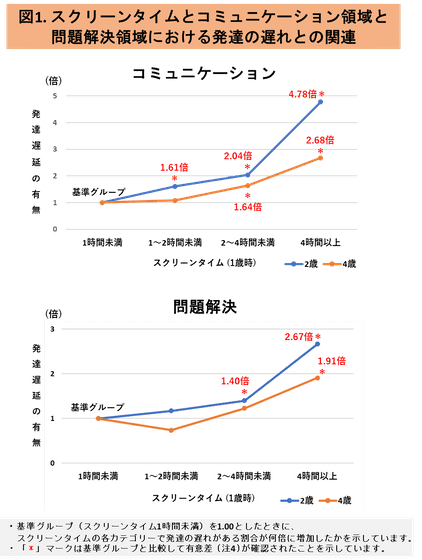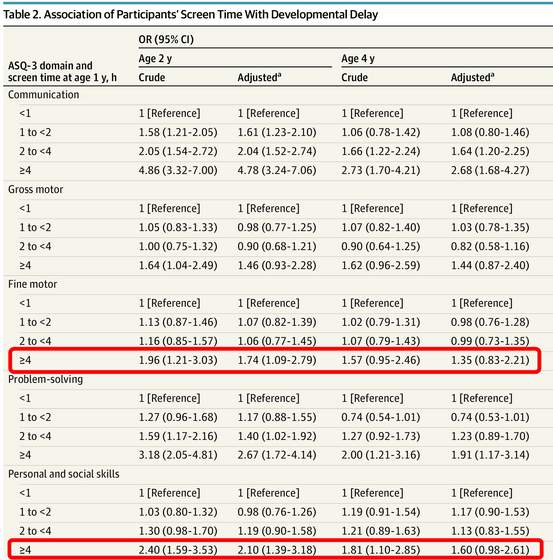Japanese study finds relationship between length of early childhood ``screen time'' and developmental delay

“Screen time” is the time we spend looking at a screen for watching television, playing video games, or using electronic devices such as smartphones and tablets. Tohoku University has found an association between the amount of screen time at age 1 and developmental delays in communication and problem-solving at age 2 and 4.
Screen Time at Age 1 Year and Communication and Problem-Solving Developmental Delay at 2 and 4 Years | Child Development | JAMA Pediatrics | JAMA Network
Screen time at 1 year old is developmental characteristics at 2 and 4 years old... | Press releases and research results | Tohoku University -TOHOKU UNIVERSITY-
https://www.tohoku.ac.jp/english/2023/08/press20230822-01-screentime.html
The World Health Organization recommends guidelines , such as limiting screen time for children ages 2-5 to one hour a day, to ensure that children can participate in sufficient physical activity. However, a 2022 study revealed that very few children adhere to these guidelines, and in particular, children's screen time is increasing due to restrictions on going out due to the pandemic of the new coronavirus infection. Concerns have been raised about the impact of screen time on children's development.

This time, a research group led by Professor Shinichi Kuriyama of Tohoku University Tohoku Medical Megabank Organization targeted 7097 pairs of mothers and children participating in the '
Screen time at 1 year of age was assessed by a questionnaire, and responses to surveys using the Japanese version of the ASQ-3 Infant Development Assessment Screening Questionnaire at 2 and 4 years of age were used to measure development. I was.
As a result of the survey, out of 7097 children, 3440 children (48.5%) spent less than 1 hour on screen a day, 2095 children (29.5%) spent 1 hour or more and less than 2 hours, and 2 hours or more and less than 4 hours. 1272 people (17.9%), 4 hours or more was 290 people (4.1%). The research group reported that the mothers of children with more screen time were characterized by younger age, less childbearing experience, lower household income and educational background, and a tendency to postpartum depression.
Analysis of these data showed that there was an association between screen time at age 1 and developmental delays in communication and problem-solving at age 2 and 4. I was.
Specific results are as follows. Compared with children who spent less than an hour of screen time at age 1, children with 4 hours or more of screen time were 4.78 and 2.68 times more likely to have delays in communicative development at age 2 and 4, respectively. had doubled. Also, in the area of problem-solving, developmental delay was observed at a rate of 2.67 times for 2-year-olds and 1.91 times for 4-year-olds.

On the other hand, we also found that the effects of screen time on development differed greatly depending on the area. In addition to communication and problem-solving, the research group also investigated 'fine motor' and 'personal and social skills', which are fine motor skills using hands and fingers. The developmental delay in these areas observed at the age of 2 could not be confirmed at the age of 4. Also, 'gross motor', which is a large movement of the limbs, was not associated with screen time at any point.

The research group proposes two hypotheses as to why the developmental delays in fine motor skills and social skills of fingers and hands have been resolved. The first hypothesis is that the developmental delay at age 2 has caught up by age 4. And the second is the occurrence of the reverse causality that delays in fine motor skills and personal and social skills increase screen time.
Studies have also reported that longer screen time using educational programs was associated with higher language ability, while overall screen time was associated with lower language ability. , The research group said, ``It is not realistic to drastically reduce screen time in modern times when digital devices are rapidly spreading.Screen devices also include an educational aspect, and previous research has shown that educational screen devices Its use has been shown to have a positive impact on development,' he emphasized, emphasizing that the results of this study do not recommend limiting screen time.
It is pointed out that how technology affects children's academic ability is ``depending on how it is used,'' and is the method of limiting usage time obsolete-GIGAZINE

Related Posts:
in Science, Posted by log1l_ks







